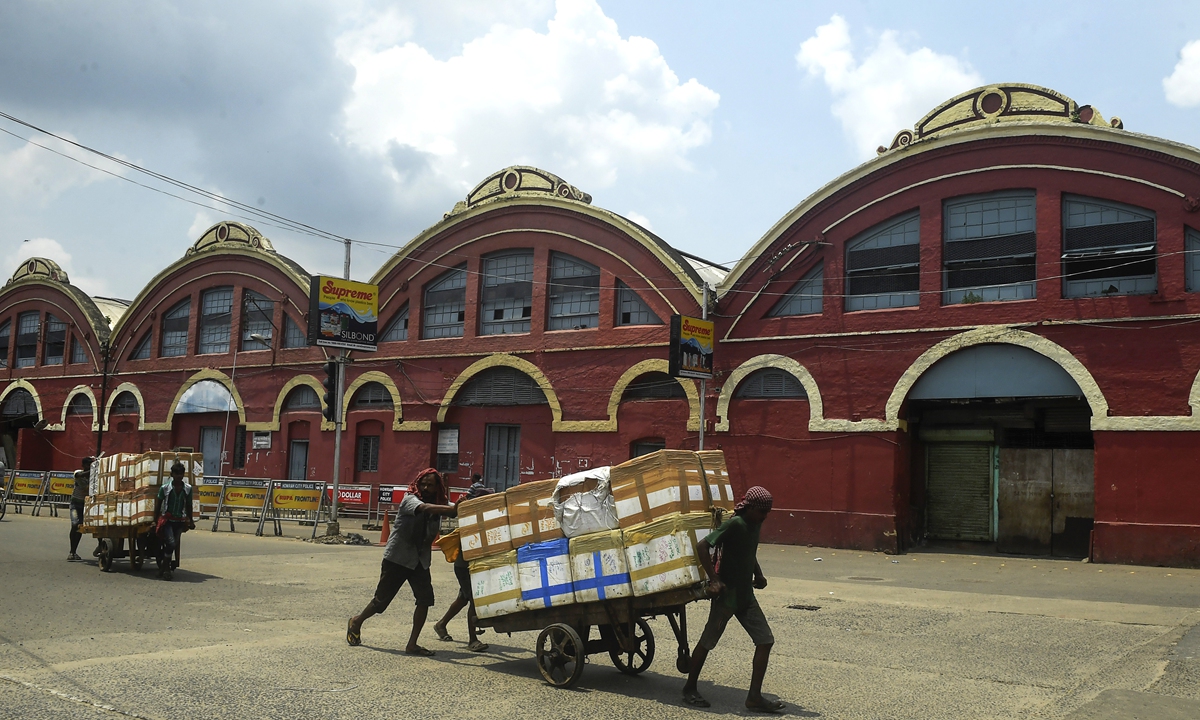India should turn to China to curb epidemic and stop stoking nationalist sentiment: experts
By Wang Qi Source: Global Times Published: 2020/9/1 1:22:36

Laborers push a cart at the Howrah railway station during a day-long, state-imposed lockdown as a preventive measure against the surge in COVID-19 cases, in Kolkata on Monday. India on Sunday set a coronavirus record when it reported 78,761 new infections in 24 hours – the world's highest single day rise even as it continued to open up the economy. Photo: AFP
A world-record daily surge of new COVID-19 cases by 78,761 in the last 24 hours has been seen in India, and the World Health Organization is concerned about hygiene conditions and a lack of prevention measures in the country. Some observers believe that India's epidemic and economy are likely to get worse but that this is unlikely to create a domestic political crisis, as hawks will blame China for their anti-epidemic failure.
India is the third hardest-hit nation after the US and Brazil. On Sunday, 948 deaths were recorded, lifting the official death toll to 63,498, NDTV reported.
Due to the pressure on the economy, the Indian government released guidelines for the fourth phase of unlocking, or "Unlock4" on Saturday, resuming subway service from September 7. From September 21, the rules allow social, religious and sporting activities within the scale of 100 people. "Unlock4" will last until September 30, media reports said.
However, lifting restrictions is more like a choice in a dilemma rather than a governmental certificate of safety, as many observers said daily cases of 100,000 is not unrealistic if the trend goes on.
A Bombay-based observer who requested anonymity told the Global Times on Monday that although officials said the rise in cases is related to the increase in nucleic acid testing, many Indian epidemiologists have acknowledged that the epidemic is spreading to rural areas while the current testing is mainly carried out in big cities.
The medical infrastructure in rural areas is more fragile than in big cities, so the spread could be fast and the conditions could be extremely challenging, said the observer, noting that the Indian government can do little but wait for a vaccine, as the coronavirus is spreading across the country without much resistance.
India has cooperated with major international vaccine producers in Russia, the UK, the US and Japan, but there have been no reports of vaccine cooperation between China and India. The bilateral relations between the two countries have been strained by a territorial dispute.
Wang Dehua, director and professor of Institute of South & Central Asia Studies, Shanghai Municipal Center for International Studies, told the Global Times on Monday that unlike South Korea and Japan, India has not expressed a need for greater health cooperation and assistance with China, adding that it is unwise to blindly follow the US by clashing with China.
Despite the nationalist sentiment in India, Wang sees little chance of India joining the US camp as India needs to get the most out of the China-US balance.
Wu Qian, a spokesperson for China's Defense Ministry, said on Thursday that China and India have both agreed to further ease tensions along the border, Xinhua reported.
Despite the current chaos in India, Wang said political turmoil is unlikely. India's states have a high degree of local autonomy, along with a host of other concerns to distract attention, so the central government's role in local epidemic prevention and control is limited.
Also, as with the US, India's hawkish politicians have been stoking nationalist sentiment by blaming China for their failures in epidemic control, said Wang.
Posted in: CHINA-INDIA